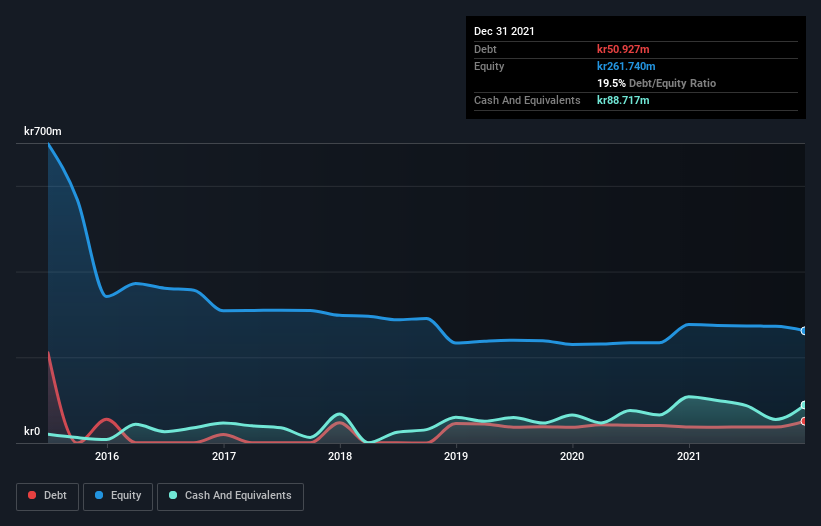Warren Buffett famously said, 'Volatility is far from synonymous with risk.' So it seems the smart money knows that debt - which is usually involved in bankruptcies - is a very important factor, when you assess how risky a company is. Importantly, Goodtech ASA (OB:GOD) does carry debt. But is this debt a concern to shareholders?
What Risk Does Debt Bring?
Debt is a tool to help businesses grow, but if a business is incapable of paying off its lenders, then it exists at their mercy. Part and parcel of capitalism is the process of 'creative destruction' where failed businesses are mercilessly liquidated by their bankers. However, a more usual (but still expensive) situation is where a company must dilute shareholders at a cheap share price simply to get debt under control. Of course, debt can be an important tool in businesses, particularly capital heavy businesses. When we think about a company's use of debt, we first look at cash and debt together.
View our latest analysis for Goodtech
How Much Debt Does Goodtech Carry?
As you can see below, at the end of December 2021, Goodtech had kr50.9m of debt, up from kr37.1m a year ago. Click the image for more detail. But it also has kr88.7m in cash to offset that, meaning it has kr37.8m net cash.

A Look At Goodtech's Liabilities
We can see from the most recent balance sheet that Goodtech had liabilities of kr209.1m falling due within a year, and liabilities of kr46.2m due beyond that. On the other hand, it had cash of kr88.7m and kr118.0m worth of receivables due within a year. So its liabilities total kr48.6m more than the combination of its cash and short-term receivables.
While this might seem like a lot, it is not so bad since Goodtech has a market capitalization of kr222.1m, and so it could probably strengthen its balance sheet by raising capital if it needed to. However, it is still worthwhile taking a close look at its ability to pay off debt. Despite its noteworthy liabilities, Goodtech boasts net cash, so it's fair to say it does not have a heavy debt load! The balance sheet is clearly the area to focus on when you are analysing debt. But it is future earnings, more than anything, that will determine Goodtech's ability to maintain a healthy balance sheet going forward. So if you want to see what the professionals think, you might find this free report on analyst profit forecasts to be interesting.
In the last year Goodtech wasn't profitable at an EBIT level, but managed to grow its revenue by 4.1%, to kr537m. We usually like to see faster growth from unprofitable companies, but each to their own.
So How Risky Is Goodtech?
By their very nature companies that are losing money are more risky than those with a long history of profitability. And we do note that Goodtech had an earnings before interest and tax (EBIT) loss, over the last year. Indeed, in that time it burnt through kr8.3m of cash and made a loss of kr18m. However, it has net cash of kr37.8m, so it has a bit of time before it will need more capital. Overall, we'd say the stock is a bit risky, and we're usually very cautious until we see positive free cash flow. When analysing debt levels, the balance sheet is the obvious place to start. However, not all investment risk resides within the balance sheet - far from it. For instance, we've identified 1 warning sign for Goodtech that you should be aware of.
When all is said and done, sometimes its easier to focus on companies that don't even need debt. Readers can access a list of growth stocks with zero net debt 100% free, right now.
New: Manage All Your Stock Portfolios in One Place
We've created the ultimate portfolio companion for stock investors, and it's free.
• Connect an unlimited number of Portfolios and see your total in one currency
• Be alerted to new Warning Signs or Risks via email or mobile
• Track the Fair Value of your stocks
Have feedback on this article? Concerned about the content? Get in touch with us directly. Alternatively, email editorial-team (at) simplywallst.com.
This article by Simply Wall St is general in nature. We provide commentary based on historical data and analyst forecasts only using an unbiased methodology and our articles are not intended to be financial advice. It does not constitute a recommendation to buy or sell any stock, and does not take account of your objectives, or your financial situation. We aim to bring you long-term focused analysis driven by fundamental data. Note that our analysis may not factor in the latest price-sensitive company announcements or qualitative material. Simply Wall St has no position in any stocks mentioned.
About OB:GOD
Goodtech
Provides control systems, digitization, and production solutions for production companies in Norway, Sweden, Finland, Europe, and internationally.
Flawless balance sheet and good value.
Market Insights
Community Narratives




